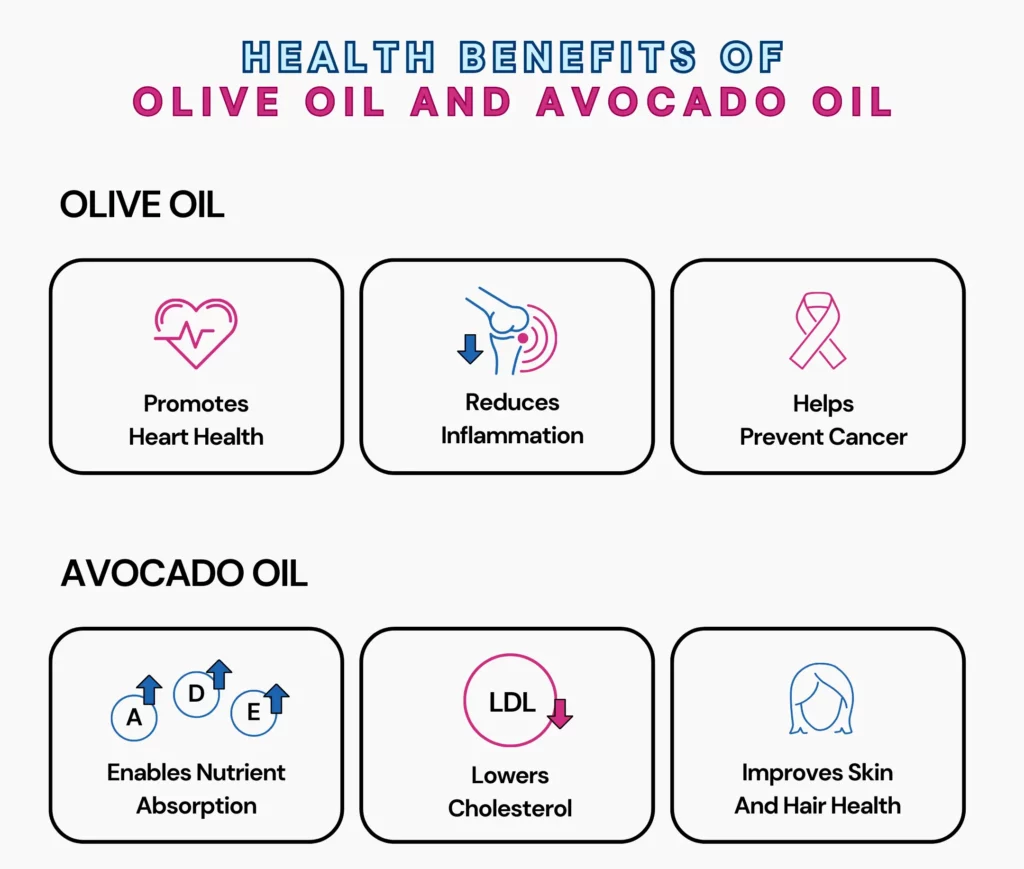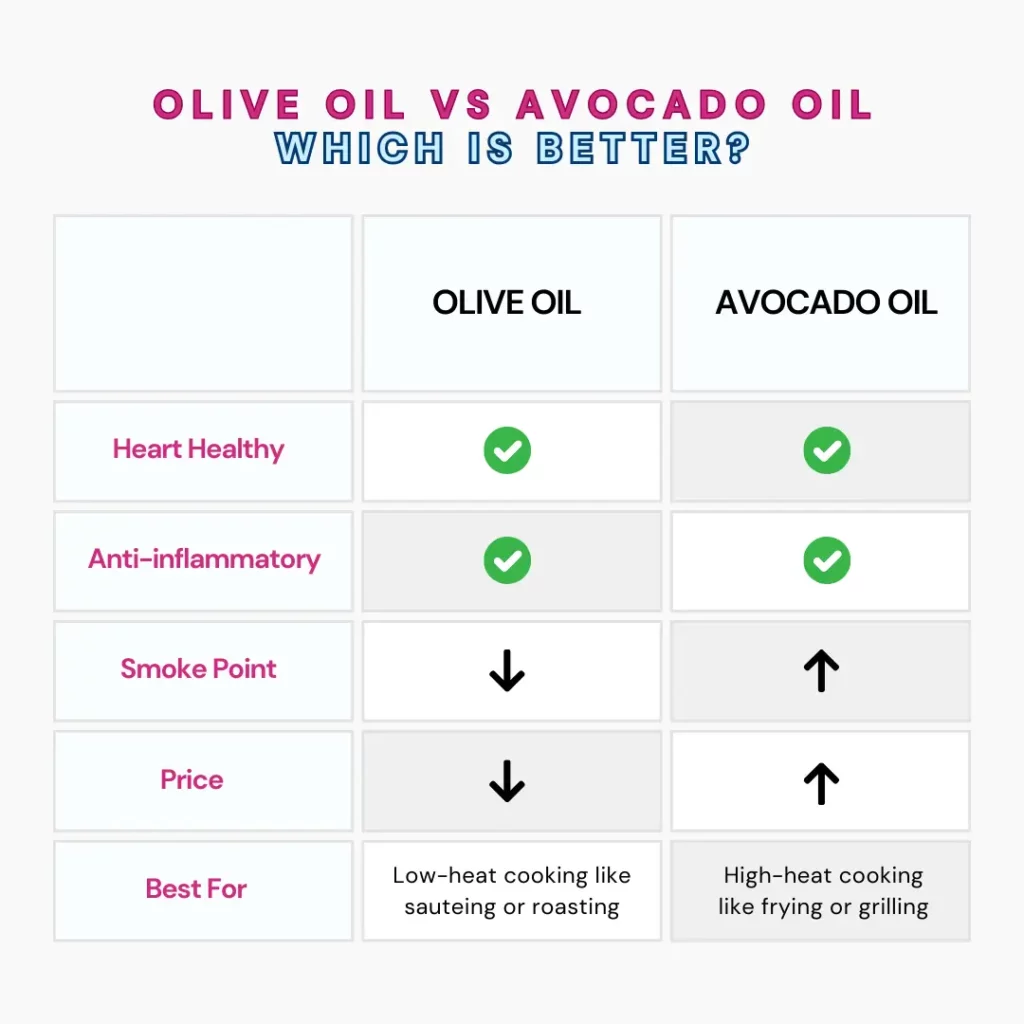Low calorific value, high antioxidant content, and healthy fats galore. What’s not to love about healthy oils like avocado and olive oil? Thanks to their innumerable health benefits, they’re all the rage now. But is one healthier than the other? To answer this question, let’s explore the similarities and differences between avocado and olive oil.
Nutritional Profiles of Avocado Oil vs Olive Oil
First things first, let’s take a look at their nutritional profiles:
| Parameter | Avocado Oil | Olive Oil |
| Calorific Value (kJ/kg) | 129 | 120 |
| Fat Composition Saturated fat Monounsaturated fat Saturated fat | 14 g 2 g 10 g 2 g | 13.5 g 2 g 10 g 1.5 g |
| Antioxidants (Vitamin E) | 23% of daily value (DV) | 33% of DV |
Here, we can see that:
- Avocado oil has a moderately higher calorific value.
- Olive oil has a slightly lower saturated fat content.
- Olive oil has somewhat more antioxidants per serve.
Avocado Oil vs Olive Oil: Health Benefits
Health Benefits of Olive Oil
Olive oil offers a host of health benefits, such as:
Heart Health
Olive oil is rich in mono-unsaturated fatty acids (MUFAs).
These fatty acids help increase the ‘good’ HDL cholesterol levels and decrease the ‘bad’ LDL cholesterol levels.
In fact, among all plant-based cooking oils, olive oil has the highest levels of MUFAs.
Olive oil is also anti-thrombotic, reducing the chances of a blood clot.
Its anti-atherogenic properties help clean up dangerous deposits in your blood vessels.
These properties are healthy for the heart and prevent heart disease.
Anti-inflammatory Properties
Chronic inflammation encourages the onset of chronic and degenerative diseases.
Olive oil has a high polyphenol content, which helps reduce inflammatory molecules.
Chronic Disease Prevention
Olive oil combats chronic inflammation, reducing the risk of metabolic, cardiovascular, joint, and neurodegenerative diseases.
Polyphenols present in olive oil also have anti-cancer, anti-thrombotic, and anti-atherogenic properties.
For this reason, consumption of olive oil may help prevent some cancers.
Health Benefits of Avocado Oil
Nutrient Absorption
Avocado oil is also rich in monounsaturated fats.
They enhance fat-soluble vitamin absorption (Vitamins A, D, E, and K).
Meals enriched with avocado oil help your body absorb vitamins effectively.
Skin and Hair Health
Avocado oil is highly moisturizing and is rich in vitamin E, a potent antioxidant.
Vitamin E supports skin health by reducing oxidative stress and hydrating skin.
It can also improve the skin's elasticity and soothe irritated or dry skin.
When applied topically, avocado oil may:
- Boost collagen production, promoting skin repair and reducing wrinkles.
- Soothe skin conditions like eczema or psoriasis.
- Nourish the scalp, improve hair strength and shine, and help reduce dandruff.
Heart Health
Avocado oil is also rich in MUFAs, which are known to improve heart health.
Studies have found that avocado oil lowers bad LDL cholesterol and increases good HDL cholesterol levels.
They reduce inflammation and improve overall cardiovascular function.
Avocado oil also contains beta-sitosterol, a compound that further lowers cholesterol levels.
Thus, avocado oil supports cardiovascular health, too.

Avocado Oil vs Olive Oil: Cooking Uses
Smoke Point Comparison
Smoke point is the temperature at which the fats in the oil begin to break down and turn into smoke.
Olive oil’s smoke point is around 374–405°F (190–207°C), making it a safe choice for cooking at home.
Avocado oil’s smoke point is around 500°F (260oC), making it a chef's favorite and one of the most versatile cooking oils in larger kitchens.
Taste Differences
Both olive and avocado oils can be used for cooking.
However, both oils have different taste profiles.
Olive oil has a smooth and versatile flavor profile– it is nutty, fresh, and peppery.
Avocado oil, on the other hand, is a more grassy, mildly sweet, and buttery flavor.
Between the two, olive oil is more suitable for nearly all foods.
Best Uses for Each Oil
Olive Oil
Olive oil, particularly extra virgin olive oil (EVOO), is ideal for low- to medium-heat cooking, dressings, and drizzling.
It's delicate and flavor-rich, perfect for uncooked dressing or gentle sautéing.
Due to its smoke point, it is better suited for lower-heat cooking and finishing dishes.
Olive oil can be best used in the following ways:
- Salads & dressings
- Drizzling on veggies
- In pasta dishes
- Dipping & spreading
- For light sautéing
Avocado Oil
Avocado oil's higher smoke point makes it perfect for high-heat cooking.
Its mild, neutral flavor makes it versatile for everything from frying to roasting.
With a smoke point of around 520°F (271°C), it is ideal for high-temperature techniques like frying, searing, and roasting.
Avocado oil can be best used for:
- Frying & searing
- Roasting vegetables
- Grilling meats
- Homemade mayonnaise & dressings
- Stir-fries
Avocado Oil vs Olive Oil: Which Is Better?
Both oils have similar health benefits and are great for your health in the long run.
However, they have slightly varied nutritional value, and both oils have their spheres of use.
Olive oil is the more practical option at home.
It has the highest amount of MUFA among plant-based oils, making it a sought-after option for cooking.
Still, avocado oil has nearly the same health benefits and is considered one of the healthiest oils for cooking.
It could be a healthy option while eating out.
Avocado Oil vs Olive Oil: Price and Accessibility
- Cost Comparison: Producing avocado oil is costlier, so a bottle could cost up to US$15, while a similar bottle of olive oil costs up to US$10.
- Availability: Avocado oil is easily obtained only in regions where avocados are grown naturally, while olive oil is readily available worldwide.
Avocado Oil vs Olive Oil: The Bottom Line
Avocado and olive oil are considered healthy fats and have many health benefits.
When choosing between the two, you can consider factors like flavor, price, and cooking methods.

Frequently Asked Questions
Is Avocado Oil Better Than Olive Oil For Stir-Frying?
Avocado oil is ideal for stir-frying due to its high smoke point.
Olive oil is more suitable for lighter cooking techniques like roasting.
Who Should Avoid Avocado Oil?
Avocado oil can cause skin irritation on some skin types if consumed in excess.
It’s best to avoid avocado oil if you have any kind of vegetable oil allergy.
Can You Mix Olive And Avocado Oil?
Mixing the oils results in a product with a unique aroma, better smoke point, and a balanced nutritional profile.
Summary: Avocado Oil vs Olive Oil
- Olive and avocado oils are healthy for the heart due to their high monounsaturated fatty acids (MUFAs) content.
- They both reduce inflammation and promote body health.
- Both olive oil and avocado oil are easy to cook with thanks to their high smoke points.
- Olive oil is better for low-heat cooking at home, like sauteing.
- Avocado oil is better for high-heat cooking, like roasting or frying
- Overall, both oils are sustainable and are great choices for your health in the long run.
References
- https://health.usnews.com/wellness/food/articles/avocado-oil-vs-olive-oil-what-is-the-difference
- https://www.healthline.com/nutrition/avocado-oil-vs-olive-oil
- https://www.ncbi.nlm.nih.gov/books/NBK534869/
- https://www.sciencedirect.com/topics/agricultural-and-biological-sciences/sitosterol
- https://www.healthline.com/nutrition/9-avocado-oil-benefits#TOC_TITLE_HDR_5




